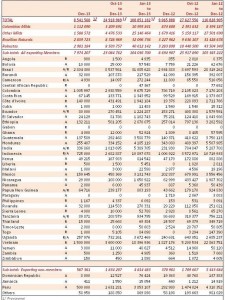Share your coffee stories with us by writing to info@comunicaffe.com.
LONDON – World coffee exports amounted to 8.54 million bags in December 2013, compared with 9.07 million bags in December 2012 (-5.8%).
Exports of Other Milds, Brazilian Naturals and Robustas were lower year‐on‐year, by 5.4%, 11.4% and 9.2% respectively. Only Colombian Milds were significantly higher at 1,112,090 bags, up 27.1% on year.
Exports in first three months of coffee year 2013/14 (Oct/13 to Dec/13) have fallen by 9.8% in comparison with the first three months of the last coffee year.
In the twelve months ending December 2013, exports of all forms of coffee by exporting countries to all destination totalled 108,851,182 bags, down 1. 8% compared to the record volume of 110,828,905 bags recorded in 2012.
Exports of Arabica totalled 68.24 million bags compared to 67.32 million bags last year; whereas Robusta exports amounted to 40.61 million bags compared to 43.50 million bags.
5th India International Coffee Festival (IICF 2014)
The Executive Director, Robério Silva, gave a speech at the 5th India International Coffee Festival (IICF 2014).
The festival took place from 21 – 25 January 2014 in Bangalore, India, on the theme ‘Changing the Face of Coffee’. Here’s a the text of the speech Ladies and gentlemen,
It is a great pleasure for me to be here with you at the 5th Indian International Coffee Festival.
I would like to congratulate the organizers of such a well attended and enjoyable event, one that has managed to position itself as one of the leading gatherings in our coffee calendar.
I also wish to acknowledge the importance of the efforts made by the Indian Coffee Board, in particular Mr. Jawaid Akhtar who is the present Chairman of the International Coffee Council, in representing the coffee trade and industry in this beautiful country with the dedication and success.
It is very fitting to name this festival “The Changing face of coffee”. Over the past years we have seen the coffee sector change tremendously. We have seen new markets develop in emerging economies, fuelling an ever growing demand.
Parallel to these new markets, we have seen the emergence of new trends in mature markets once stagnant, revitalized – thanks to the development of single origin coffees, the single serve trend and in general an increased awareness of the many possibilities of drinking speciality coffees.
We are faced with many challenges in our industry, such as low prices for producers, climate change, access to finance, low productivity, the fight against pests and diseases.
We can label all these issues under “sustainability”. It requires urgent and effective attention from our part.
However, it is of a scale which no single entity, be it public or private, can tackle on its own.
Rather, concerted work from diverse stakeholders along the complex coffee supply chain is needed.
I include in this supply chain everyone whose work is directly or indirectly linked to bringing the bean to the cup, from researchers to agronomists, from traders to baristas, from producers to policy makers.
India has an increasingly important role to play in the development of the world coffee market.
It is already the 6th largest producer and one whose excellent qualities are highly in demand in Europe, Asia and North America.
In particular, it has experienced a vibrant growth in the processing and export of soluble coffee, further proof of the visionary quality of its entrepreneurs who rightly understood the market.
It is thus with great satisfaction that I come here to join you and manifest the full support of the International Coffee Organization and of the entire global coffee community.
















